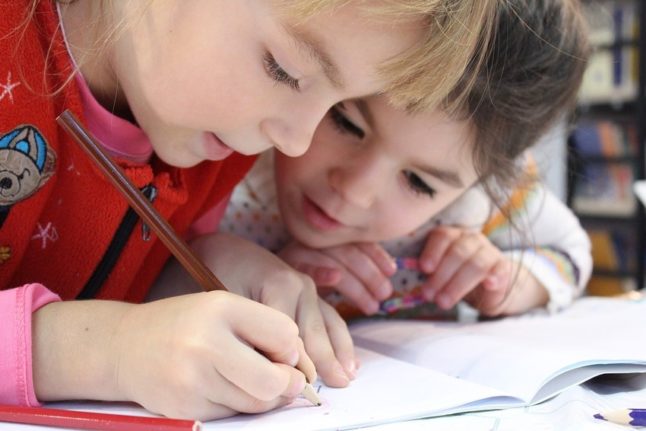At a first glance, modern Greek looks and sounds different to German and it would be hard to tell what the two languages have in common.
Yet there are a few German words that originate from this Mediterranean country and even share a similar meaning – and the same gender, to their Greek counterparts today.
The Local spoke with archaeologist Caitlín Barrett at the Department of Classics at Cornell University about the original meaning these words held. How many were you already aware of?
READ ALSO: The German words we use everyday – that are actually French
Die Bibliothek
The German word for library comes from the ancient Greek ‘bibliothēkē’, literally meaning ‘’book – repository’’. The modern Greek equivalent noun is also similar – H βιβλιοθήκη.

The Bibliothek of the Year in Gotha, Thuringia. Photo: DPA
Das Klima
A buzzword for the environmentally conscious, the word for ‘climate’ originally comes from the ancient Greek word ‘klínō’ literally meaning ‘to slope’.
The modern Greek word ‘το κλίμα’ shares with its German counterpart a slightly different meaning that evolved over time, as changes in temperature were considered more important to ancient geographers.
By the late 14th century the word was being used to describe a region of the earth’s surface in respect to weather.
Die Komödie
The German word for comedy film derives from the Ancient Greek word ‘κωμῳδία’, a genre of fiction that refers to discourse or work generally intending to be humorous.
READ ALSO: 10 German words which come from Italian
Interestingly, the origins of the term can be traced back to Ancient Greece, whereby within Athenian democracy the public opinion of voters was influenced by political satires performed at outdoor theatres such as the famous Theatre of Dionysus.
Die Tragödie
On the flipside, the German word for tragedy is also based on the Greek ‘τραγῳδία’, a word that has its origins in the theatre of ancient Greece 2,500 years ago.
Whilst plenty of theatre from this period has not survived, some surviving works are still widely read and remain influential today, such as pieces by Aeschylus, Sophocles and Euripides. Meanwhile, the term ‘tragedy’, or, ‘Tragödie’ has made its way into both English and German.
Der Mythos
Almost identical to the modern Greek word ‘μύθος’, the German word describes folklore and stories defined online as those tales ‘playing a fundamental role in society, such as foundational tales or origin myths’.

Photo: DPA
Barrett told us the original Greek term is a complicated one, referring to both folklore and foundational tales but also more or less anything recounted orally: speech, rumour, plots of plays and more. In more simplistic terms, it is also a popular modern Greek beer of the same name.
Die Apotheke
The German word for ‘pharmacy’ actually originates from the Ancient Greek ‘αποθήκη’ which had the original meaning of ‘storehouse’ or ‘storeroom’, and still exists in Greek today.
Der Elefant
The German word for ‘elephant’ shares similarities with its English counterparts. Both have their roots in the Greek ‘ἐλέφας’. For those clued up on Greek historians, the word goes way back, originally used by Homer to mean ivory but referring to the animal after the time of Herodotus.
Der Arzt
'Doctor' in German originally comes from the Ancient Greek word 'ἀρχιατρός' which was the chief physician, and the primary physician to the emperor.
Whilst the English word 'doctor' has its roots in Latin, the German word for a physician comes from the Ancient Greek. It is used in German today as a more general term for physician, however.
Das Auto
Whilst the English ‘car’ takes from the Latin ‘carrus’ the German word ‘Auto’ is a compound from the Ancient Greek ‘αὐτός’ (meaning self) and Latin ‘mobilis’ (movable).
Whilst not used in Britain so much anymore, the term ‘Auto’ still exists in everyday Dutch and German. Who knew?!



 Please whitelist us to continue reading.
Please whitelist us to continue reading.